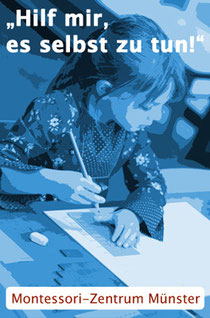Dissertations at the Montessori Centre
Within recent years several dissertations have been successfully concluded in the context of the Montessori Centre at the University of Münster. They are all empirically oriented or at least contain elements of empirical research.
Wang, Chiu-Ping: “New Education and alternative schools in Taiwan — An educational research from 1949 till 2005 taking special account of ten alternative schools”, diss. Münster 2005.
The author from Taiwan, who is living in Shanghai at present, studied at the University of Münster for many years and also collaborated with Prof. Ludwig in the context of the course offerings in “New Education/Montessori Education”. In her dissertation she analyses the efforts of New Education in her home country and compares them to European reform approaches. In this context she analyses and evaluates a large amount of written documents and adds to her literary research especially for the ten alternative schools her own studies at these schools and interviews with the educationalists/teachers responsible. One of the analysed schools was a Montessori school, another one was a Waldorf school. The survey communicates interesting insights and findings about school development in an increasingly democratising Asian country that is scarcely considered in Germany. It is planned to publish the dissertation in the series “Impulses of New Education” by Prof. Ludwig.
Grindel, Esther: “Learning processes of highly gifted children in the Free Work of the Montessori Method — An empirical analysis on the basis of individual case studies in Montessori primary schools”, diss. Münster 2005.
The fostering of highly gifted children has been a focus of research in the Montessori Centre since the 1990s. The relations with the internationally renowned scientist Prof. Dr. Franz Mönks, University of Nijmegen (Netherlands), go back to these times. He gave the principal speech at a Montessori conference on individual fostering as early as 1997. The beginnings of the dissertation by Esther Grindel, holder of the Montessori diploma and former assistant at the Montessori Centre, also date back to this time. The survey analyses in an empirical way how and under which conditions highly gifted primary school children can learn according to their individual competencies and needs in the periods of Free Work, which is a characteristic way of learning in the Montessori Method. On the basis of four descriptive case studies of highly gifted students of a Montessori primary school typical structures of their ways of learning during the Montessori Free Work are investigated in a comparative analysis. The results, which are discussed in the context of current findings of the research on high abilities, are of great interest to both the Montessori schools and for the fostering at regular schools. A publication of the work as part of the series “Impulses of New Education” is in preparation.
Hanewinkel, Nicole: “Learning by doing with Maria Montessori’s fraction material — An analysis of operations and mathematical processes of understanding of primary school children”, diss. Münster 2006.
The interdisciplinary cooperation with didactics of different fields of learning has long been part of the fields of research at the Montessori Centre. Dissertation publications on “Sachunterricht” (a subject with parts of both natural and social sciences) by Walburga Henry (2001, primary advisor: Ms Prof. Dr. Kornelia Möller) and “musical education” by Hildegard Hosterbach (2005, co-advisor: Ms Prof. Dr. Ursula Ditzig-Engelhardt) are already available. The dissertation by Nicole Hanewinkel, holder of the Montessori certificate and former colleague/assistant at the Montessori Centre, deals with the possibilities of action-oriented mathematical learning at the example of Montessori’s fraction material in the horizon of the current Fachdidaktik (co-advisor: Prof. Dr. Martin Stein).
Nicole Hanewinkel’s focus of interest is not primarily on the Free Work, which is a characteristic way of learning in the Montessori Method, and its didactic possibilities for mathematics. Her aim is rather “to gain and depict an insight in the microcosm of occurring teaching and learning processes while working with the fraction material”. In this context she uses interpretative methods, which she considers to be a subarea of the non-statistical empirical research, that are also used in the research on didactics of mathematics. A decisive reason for her decision is the premiss that she considers “the observed children’s work with the fraction material as an process of individual constitution of sense”, which can only be investigated appropriately with methods that aim at understanding. The results are based on observations of the children handling the Montessori fraction material, which were carefully carried out, documented and meticulously analysed with the help of video cameras, audio tapes and written records.
Central questions of the survey are: “1. Which imaginations of fractions can be reconstructed from the gained data? 2. How do the children deal with Maria Montessori’s fraction material in the observed scenes and which conclusions can be drawn? 3. Do we gain any insights concerning the underlying basic idea of the Montessori Method that the child can derive or develop specific mathematical relations and meanings by both actively dealing with the material and receiving (tactical) support and instruction from the teacher?”.
The gained results of the survey are of great interest for both the mathematical didactics and the critical and constructive development of the Montessori Method.

 Kompetenz in Montessori-Pädagogik
Kompetenz in Montessori-Pädagogik
